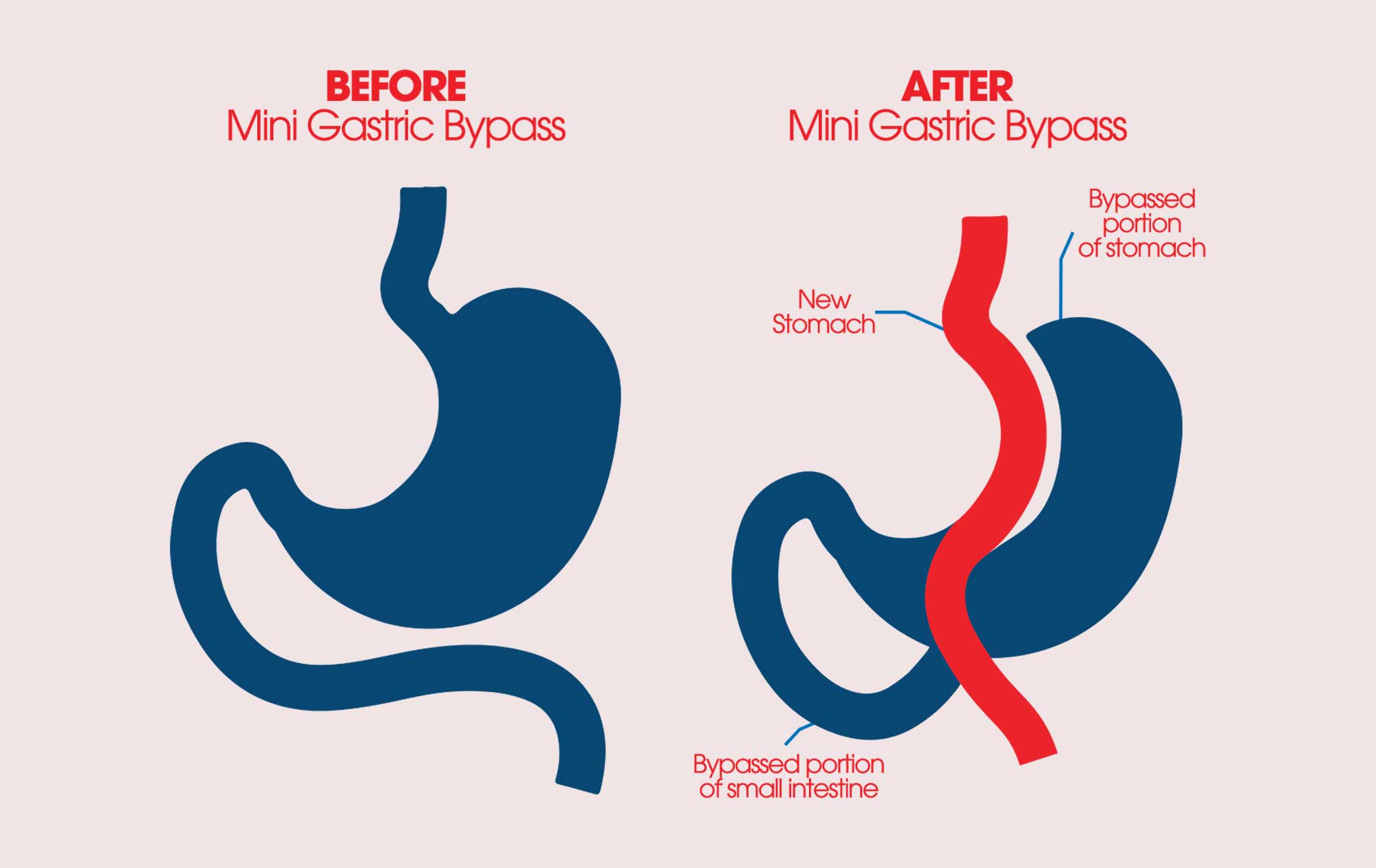Mini Gastric Bypass
If you’re looking for a simple and short inexpensive technique when it comes to choosing a weight loss surgery option then you may be considering a mini-gastric bypass. While you may have heard the term before or know a little about it, you might not know much about it in detail or the upsides and risks.


Take the time to understand more about the pros and cons so you can make the right decision for yourself and your body on your weight-loss journey. You may have always assumed that RNY gastric bypass surgery was an ideal choice because it’s a well-established and known procedure. However, it may be comforting to know many people are still choosing to have mini gastric bypass surgery because of the numerous benefits it has to offer.
About Mini Gastric Bypass
A mini gastric bypass is completed similarly to a traditional gastric bypass. A pouch is created in the stomach to decrease the overall accessible stomach volume, which prevents the patient from eating as much food at one time.
The primary difference between mini gastric bypass surgery and a full gastric bypass is that the mini version of the surgery is performed in a modified manner that involves less intestinal rerouting and a shorter overall surgery time. In the mini procedure, more of the intestine is bypassed compared to the standard gastric procedure. There’s also little risk of complications because the procedure has fewer steps.
Pros
Generally speaking, mini gastric bypass is less invasive, faster, and has shorter recovery times than RNY. There is also less rerouting of the small intestine. There are many pros to having mini gastric bypass surgery that you should be aware of and take into consideration. For example:
- The mini bypass decreases the risk of comorbidities. These are conditions resulting from morbid obesity. It relieves obesity symptoms like sleep apnea, diabetes, edema, and arthritis.
- It is less invasive, and therefore safer. It has reduced chances of complications because it has a fewer intestine connections or anastomosis.
- It is a lot shorter in terms of operating and recovery. The mini surgery takes around an hour and the patients are allowed to leave the hospital in 24 hours.
- It involves less rerouting of the intestines. This means that it is technically easier, even for the surgeons to perform the surgery with higher success rates.
- It is less expensive compared to the traditional gastric bypass.
- Patients are able to get back to normal activities within a week; the healing process is relatively quick because the procedure is less invasive.
Cons
While there are many benefits of a mini-gastric bypass, it’s not to say that it doesn’t come with its own set of risks. For instance, it may be less effective than a traditional gastric bypass because it doesn’t transform the digestive system dramatically. However, you still can expect to have a significant amount of weight loss and metabolic benefits.
Additional cons you should know about include:
- High risks of malabsorption and vitamin and mineral deficiency complications. The reason being is that a large portion of small intestines gets bypassed during the procedure.
- There are chances of bile reflux gastritis. This is considering that mini-gastric bypass surgery does not divert the bile and digestive enzymes from the stomach. Therefore, there are chances of a condition that can be hard to treat.
- Even though the mini surgery is less invasive, it still carries potential infection risks. Leakage or infection among staples connecting revised stomach pouch and intestines can’t be ruled out.
- Dumping syndrome might occur. It occurs when the food tends to pass too quickly through the digestive tract, which leads to dizziness, diarrhea, and nausea.
- There is a possibility of complications similar to Roux-en-Y gastric surgery. The most common being surgical site hernias, ulcers, and other minor infections.
Making A Decision


The reason mini gastric bypass surgery has had a long road to acceptance is mostly because it has had to contend with the already established and popular RNY gastric bypass surgery. However, that doesn’t mean you should rule it out and not consider it as you try to determine a suitable choice for you and your body. Your pre-operative weight, height, and weight-loss expectations that you have will help your surgeon decide the actual length of the bypass but it’s typically between three to about seven feet. Also, if you suffer from or experience GERD or acid reflux then you should choose the traditional procedure instead of the mini gastric bypass.
Generally speaking, the mini gastric bypass is a slightly safer option and a slightly easier alternative to the traditional gastric bypass. The results with the mini-gastric bypass and the traditional gastric bypass are similar. You should also take into account the list of pros and cons and what you feel most comfortable with and what a surgeon recommends given your circumstances. It’s best to speak with a surgeon ahead of time and discuss any concerns and what you’re thinking so they can make an evaluation and suggestion on the best course of action.
Conclusion
You should now know more about what to expect if you choose to have mini gastric bypass surgery. Your surgeon should be well aware of this information and the pros and cons of the surgery so you should feel comfortable having an open dialogue with them. While a mini gastric bypass isn’t a solution for everyone, it may be the right decision for you. Now that you know more about what it is and the pros and cons, you have more knowledge and details that will help you make a better and more informed decision about your health and weight loss approach. It’s always best to consult with a surgeon and get their input before you make any final choices. They have the knowledge and expertise to ensure the option you move forward with will be right and beneficial for you.